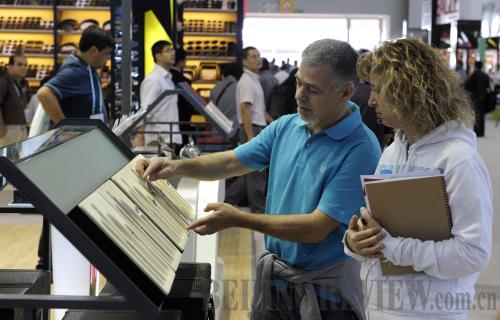|
 |
|
THREAT TO RECOVERY: Foreign buyers look at Chinese products at the 108th Canton Fair held from October 15 to November 4. China's exports have recovered, if only slightly, but uncertainties, including a weaker U.S. dollar, still loom large (LU HANXIN) |
By printing more money, the United States will also force up global commodity prices, exacerbating inflation in China, said Jing Xuecheng, a senior economist at the China International Economic Relations Association. Crude oil futures for December delivery at the New York Mercantile Exchange closed at nearly $87 per barrel on November 5, the highest since October 2008.
The hot money is a two-edged sword. It increases net investments and feeds the capital markets with ample liquidity, said Guo Tianyong, Director of the Research Center of China's Banking Industry under the Central University of Finance and Economics. But an abrupt withdrawal of the capital could prick the asset bubbles and deal a blow to the economy, he said.
An unwise decision
The Fed's move is understandable given the weak U.S. economy and bleak employment landscape, said Zhou Xiaochuan, Governor of the People's Bank of China, the central bank.
"But the U.S. dollar is an international reserve currency widely used in global trade and financial transactions," he said. "So it might cause unintended side-effects to the global economy."
"The question comes down to whether there is a problem with the international monetary system and whether there is a conflict between the global and domestic role of the greenback," Zhou said.
Chinese regulators will also keep a close eye on capital inflows and maintain the stability of the economy, he said.
The U.S. move is expected to spill over into the global economy, which may eventually result in a deluge of liquidity, said Cui Tiankai, China's Vice Foreign Minister, at a press briefing on November 5.
When it makes these kinds of decisions, the Fed should take into account economies all over the world, not just its own, he said.
Vice Finance Minister Zhu Guangyao said the U.S. quantitative easing was a poor decision since it will send a shockwave throughout the emerging economies.
"The current U.S. economic situation is different from that at the height of the financial crisis," he said. "The financial markets now do not lack capital, and the capital just lacks confidence for the real economy."
As issuer of a major reserve currency, the United States must recognize its role and responsibility for the world economy, Zhu added.
Preparing the defenses
In response, China needs to step up a stringent handle over speculative capital inflows and maintain its financial health, said Yi Xianrong, a researcher with the Institute of Finance and Banking at the Chinese Academy of Social Sciences.
"Despite the Chinese Government's regulatory controls, the hot money is likely to sneak in through companies overstating FDI or over-invoicing exports," he said. "Hong Kong could also act as a springboard for capital seeking access to the mainland markets."
Meanwhile, policymakers must siphon some liquidity out of the markets, said Shen Minggao, chief economist at Citigroup, Greater China. "Viable options include raising the reserve requirement ratio and issuing central bank bills."
A number of emerging economies have already started building up their defenses. Thailand, for example, on October 12 announced a 15-percent withholding tax on capital gains and interest payments for bonds held by foreign investors. It also removed limits on overseas investment to encourage capital outflows. On November 2, India and Australia raised their interest rates by a quarter percentage point amid fears over inflation.
It would also be helpful if China could shrink the trade surplus and encourage more domestic capital to invest overseas, said Shen.
Wang Tao, chief economist at UBS Securities China, believes efforts are still needed to let air out of the real estate bubble. It is necessary to fight speculation in the housing market and curb land hoarding by state-owned property developers, he said.
Xia Bin, a member of the central bank's monetary policy committee, called for a reform to the international monetary system. "A healthy world economy requires a more stable and diversified currency mechanism," he said.
| 